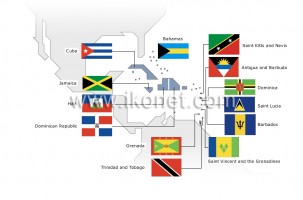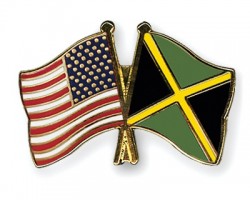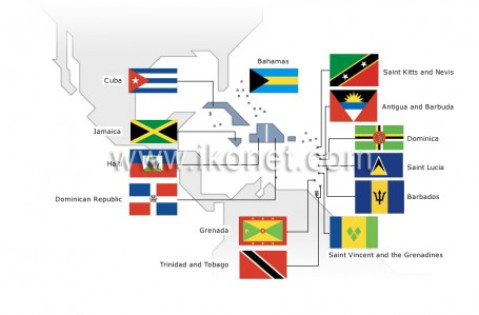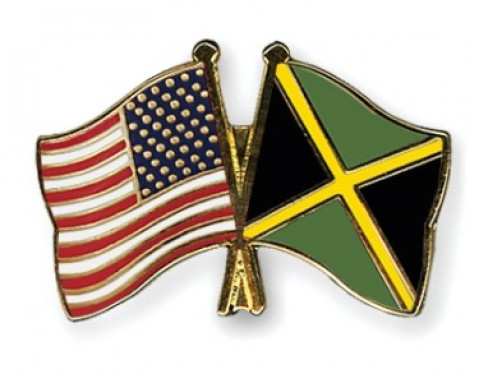Widgetized Section
Go to Admin » Appearance » Widgets » and move Gabfire Widget: Social into that MastheadOverlay zone
Political Competition & Foreign Aid
The Impact of US-based Foreign Aid and Public Administration in the Caribbean
By V. Graham
Political competition is an institutionalized aspect of Anglophone Caribbean public administration and directly impacts these  countries’ dependence on US-based foreign aid to sustain externally funded security and justice programs. This penultimate article is part of the series examining how institutional characteristics like political contestations, are likely to impact present hemispheric efforts towards sustaining rule of law programs generally, and the current emphasis on citizen security programs in particular. The main argument of this series is that, while public administration in Anglophone Caribbean countries has traditionally relied on assistance from US-based donors, the success or failure of citizen security initiatives will depend on institutional factors. Therefore US-based donors like the United States Agency for International Development (USAID), the World Bank Group, the Inter-American Development Bank (IDB), and relevant entities of the United Nations (UN), will need to understand how these institutional characteristics work for and against their priorities.
countries’ dependence on US-based foreign aid to sustain externally funded security and justice programs. This penultimate article is part of the series examining how institutional characteristics like political contestations, are likely to impact present hemispheric efforts towards sustaining rule of law programs generally, and the current emphasis on citizen security programs in particular. The main argument of this series is that, while public administration in Anglophone Caribbean countries has traditionally relied on assistance from US-based donors, the success or failure of citizen security initiatives will depend on institutional factors. Therefore US-based donors like the United States Agency for International Development (USAID), the World Bank Group, the Inter-American Development Bank (IDB), and relevant entities of the United Nations (UN), will need to understand how these institutional characteristics work for and against their priorities.
Political competition is both a blessing and a curse for Anglophone Caribbean countries. These countries commonly share a democratic Westminster-Whitehall heritage inherited from Britain, which relies on contestations to sustain it. This is why these countries, as small as they are, are required to be split among several political constituencies so political parties can democratically compete for votes by geographic segmentation, in any general or by-election. It also explains why there are also ongoing contestations in policymaking, at least between a majority Government and the Opposition; the latter always being expected to have different views or approaches. Therefore political competition, in this series, generally refers to manifestations of these contestations between political parties, and between Government and Opposition in the context of policymaking. While it is good for democracy, there are negatives. Drawing on the example of Jamaica, the rest of this article will discuss how this is relevant to donor-funded citizen security public administration.
The Ominous History of Political Competition and Security
 Jamaica’s history can constitute a textbook case of ‘how not to mix politics and security.’ The first article discussed how Jamaica’s political history reflects a narrative of conquest and resistance. This started with Spanish colonialism from 1492 to 1655 and British colonialism since then. This tradition came to a head in the 1930s and influenced Jamaican public administration since then. Colonialism in Jamaica is a story of external domination, social stratification and control of the masses through the rule of law. By the time home grown political movements and parties began to be established out of the labor riots of the 1930s, divisive cleavages had been established around charismatic leadership and dogma. The two major political parties, the Jamaica Labour Party (JLP) and the Peoples National Party (PNP), established hotly contested and bitterly divisive political campaigns to win votes. Jamaica’s history after 1962 reveals an even more ominous picture with implications for politics and security.
Jamaica’s history can constitute a textbook case of ‘how not to mix politics and security.’ The first article discussed how Jamaica’s political history reflects a narrative of conquest and resistance. This started with Spanish colonialism from 1492 to 1655 and British colonialism since then. This tradition came to a head in the 1930s and influenced Jamaican public administration since then. Colonialism in Jamaica is a story of external domination, social stratification and control of the masses through the rule of law. By the time home grown political movements and parties began to be established out of the labor riots of the 1930s, divisive cleavages had been established around charismatic leadership and dogma. The two major political parties, the Jamaica Labour Party (JLP) and the Peoples National Party (PNP), established hotly contested and bitterly divisive political campaigns to win votes. Jamaica’s history after 1962 reveals an even more ominous picture with implications for politics and security.
In Jamaica the control of the security forces was directly in the hands of the political executive after the 1962 Constitution, thereby institutionally linking politics and security, with significant consequences. This link is held together by criminality. Anti-crime policies and maintaining social order became critical to Jamaica since 1962, because of the multi-directional link between crime and politics and how Jamaica handled competitive party politics. In the book Changing Jamaica Adam Kuper discusses how the use of guns became greater in the 1960’s owing to the potent link between the illegal marijuana trade and urban politicians arming their followers. By 1972 the Minister of Home Affairs and Justice sought to introduce measures aimed at reducing the private ownership of firearms. This was met with opposition and soon anti-crime policymaking became divided along political lines. The PNP and JLP bitterly differed over the use of army-police raids, searches, and the introduction of ‘draconian measures’ in slum areas, he argues. Anthony Harriott in Police and Crime Control in Jamaica discusses how
crime and violence not only became more politicized during the 1980s, but became more transnational making the context of security and justice policymaking more supra- national. This internationalization of crime was driven by the quest for drug markets and facilitated by illegal immigration of Jamaicans to the USA primarily. Given this history, and the present dependence on US-based foreign aid to help mop up these mistakes, there are at least three lessons for these donors, relevant to the Anglophone Caribbean.
Lessons for US-Based Donors
Lesson 1: Become Political
It is impossible for donors to remain apolitical if they are to successfully support citizen security in the Anglophone Caribbean. Politics and security are institutionally linked as a result of history and constitutionally, as the example of Jamaica illustrates. Therefore in order for donors to be successful in citizen security programming, they will have to revise their domestic legislation and corporate strategies to allow for political engagement in these recipient contexts.
Lesson 2: Support Programs, Not Ministries
If US-based donors are to be successful in the Anglophone Caribbean they should prioritize cross cutting programs and not the individual programs of ministries. The last article discussed how the existence of different ministries and departments leads to duplication and asymmetries in a Westminster-Whitehall context. It should be noted that political competition is normally at the heart of these variances and so donors should expand the scope of their assistance if they want to circumvent political expediencies.
There are ways of becoming political without supporting the political exigencies of departmentalism.
Lesson 3: Focus on Citizens
If citizen security is about the responsibilities of citizens to co-produce security as the Caribbean Human Development Report 2011 states, then US-based donors should go beyond government. Presently, much of donor-funded programmatic work is initiated, authorized, and executed by state actors through government offices. There is little reliance on partnerships with non-state actors to initiate, authorize and execute these programs. It is therefore important for US-based donors to go beyond government and rely more on the wide-ranging priorities identified by citizens at a much deeper level.
Political competition is a necessary evil which can be managed. This means that US- based donors have to find their individual ways of isolating the negative aspects, and build on the democratic principle embedded within citizen security programming. Anglophone Caribbean countries have a sustained democratic heritage which makes this two-pronged effort highly feasible.






Follow Us!